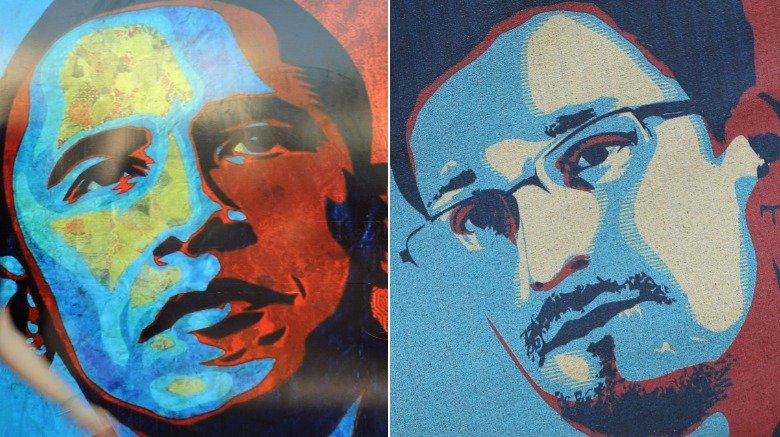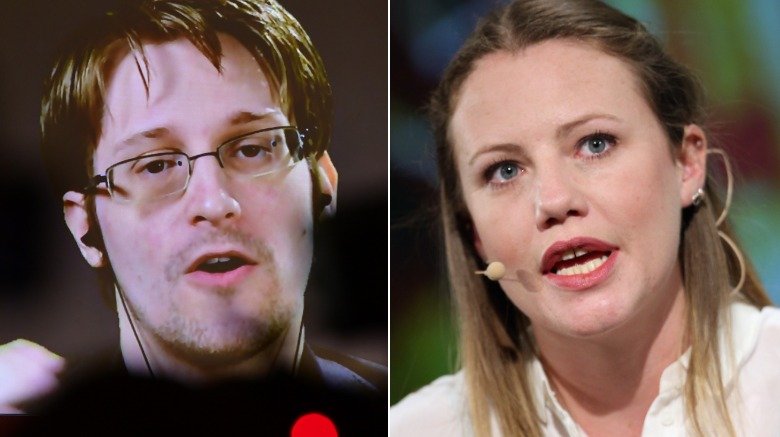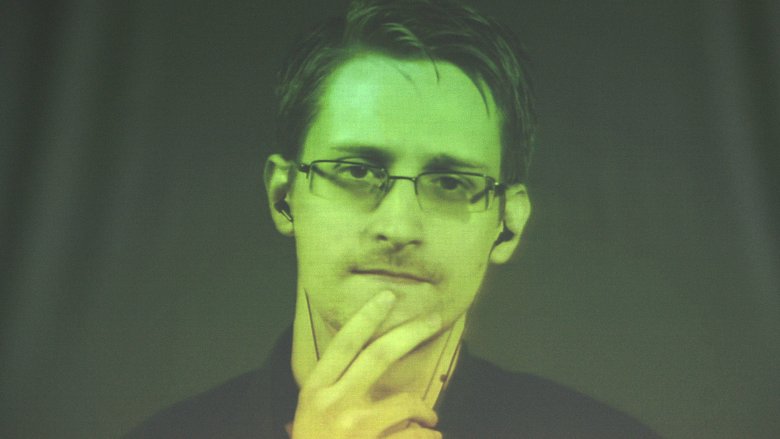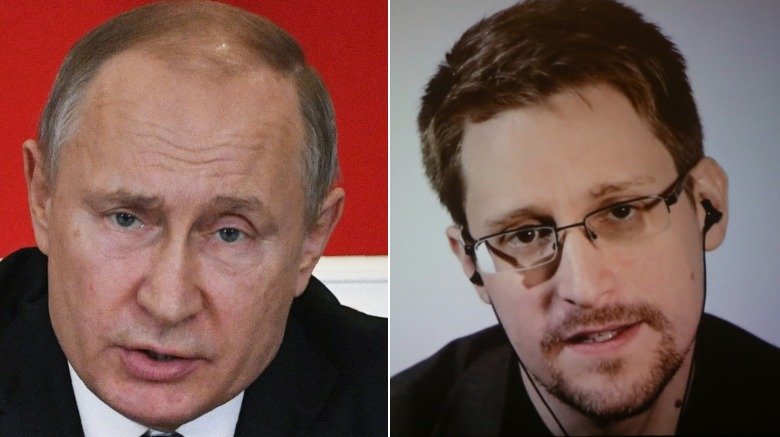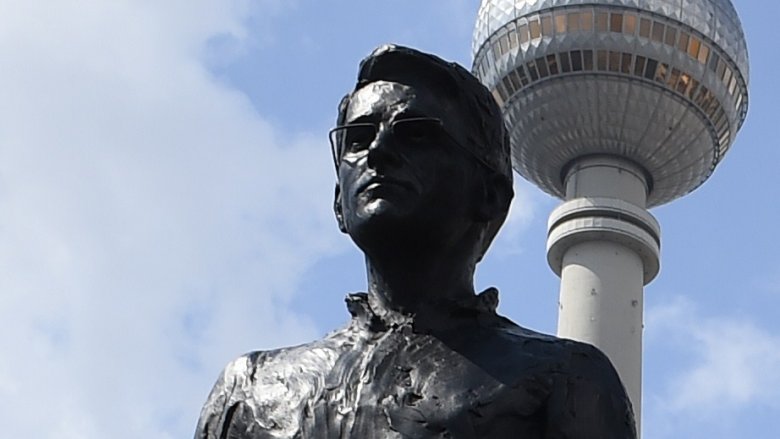Whatever Happened To Edward Snowden?
Greek mythology tells the story of Prometheus, a Titan who brightened human existence by stealing fire from the gods and giving it to people as a present. Prometheus' punishment for that theft was to be chained to a rock where every day an eagle ate his liver, which grew back every night. In 2013, high school dropout and highly skilled defense contractor Edward Snowden became a kind of cyber-Prometheus. Snowden stole inflammatory documents showing how the National Security Agency was secretly monitoring the internet and telephone activity of millions of civilians around the world and gave those documents to journalists. Afterward, the U.S. government — which is fittingly symbolized by eagles — wanted to eat him alive.
As of this writing, Snowden remains in hiding in Russia, and the question remains as to whether his Promethean thievery helped humanity. Supporters hail Snowden as a champion of digital liberty who exposed an Orwellian surveillance program. Detractors paint him as a traitor who endangered America. In that sense, he's sort of a Rorschach test for people's views on the importance of privacy and what it means to serve your country. So let's look at how Edward Snowden became a world-famous fugitive and what became of him after his escape.
O say, can you see ... us naked?
In 2013, Edward Snowden caused an avalanche of controversy for the Obama administration. Info he leaked to the Guardian showed the NSA had ordered Verizon to hand over "information on all telephone calls" inside the U.S. and between the U.S. and other nations on an "ongoing, daily basis." The government justified this indiscriminate data grab with Section 215 of the Patriot Act, a broad piece of legislation passed in response to the 9/11 terrorist attacks. The law allowed the NSA to collect "any tangible thing" from a company like Verizon if a special federal court deemed it "relevant" to a foreign intelligence investigation.
Constitution enthusiasts probably know that the Fourth Amendment forbids the government from investigating citizens at random. President Obama, who used to teach constitutional law, surely knew this. So it must have stung when a federal judge called the telephone data collection "Orwellian" and probably unconstitutional.
Snowden also exposed that the NSA secretly monitored telephone conversations of foreign allies like German Chancellor Angela Merkel. The agency even used United Nations computers to spy on EU officials. In addition, Snowden revealed that British intelligence agents engaged in widespread spying. In 2014, Snowden told the Guardian how creepy Uncle Sam can be, alleging that NSA agents regularly passed around nude pictures that private citizens sent to each other. That gross intrusion was viewed as a job perk.
Make America grave again
Snowden exposed abuses of the Patriot Act for seemingly patriotic reasons. He saw the the NSA's indiscriminate mass surveillance as a detriment to democracy and a symptom of unchecked presidential powers. But to future president Donald Trump, Snowden's whistleblowing sounded like treason. In a series of tweets posted on 2013, Trump accused him of giving government secrets to Russia and China and claimed Snowden should be executed because the penalty for treason was death when America "was great."
Obviously, Trump didn't know he would become president by promising to make America great again, and as president he shared highly classified information with Russia, so maybe he changed his stance on Snowden's supposed treason. But the tweeter-in-chief has a consistent history of wanting accused criminals to be killed. When the boys who became known as the Central Park Five were falsely arrested for rape in 1989, Trump publicly called for the death penalty. In 2014, he suggested executing Army Sergeant Bowe Bergdahl for deserting troops in Afghanistan. In 2018, he officially proposed executing drug traffickers.
Politico noted that Trump's Secretary of State Mike Pompeo has also said Snowden deserves to die, and one of Trump's 2016 campaign promises was to bring the whistleblower back to America to face punishment. Though Snowden received asylum in Russia, Trump guaranteed that Putin would have a change of heart: "Look ... if I'm president, Putin says [to Snowden], 'Hey, boom, you're gone.'"
Catch me if you Ameri-can
While working for the CIA and NSA, Snowden learned firsthand that Uncle Sam is scarily adept at tracking people. So when he stole somewhere between 200,000 and 1.7 million NSA documents, leaked them to journalists, admitted that he did it, and even showed his face on camera, it must have seemed inevitable that the U.S. would hunt him down like a high-tech bloodhound and throw him in prison for decades. Yet somehow Snowden outfoxed what's possibly the most advanced surveillance apparatus on the planet and flew to Russia before authorities could catch him. What's more, for three years almost no one knew how he did it.
The story of Snowden's escape starts in Hong Kong, where he shared highly classified information with the Washington Post's Barton Gellman, the Guardian's Glenn Greenwald, and filmmaker Laura Poitras. As Vice detailed, he initially stayed at a hotel, but once he turned himself into a walking bull's-eye, he needed to split like a frightened banana. Aided by a lawyer, he snuck into Hong Kong's slums and lived with refugees. According to Quartz, he shared a bedroom with two people and survived on a diet of McDonald's, cakes, and other junk food. After 12 days he was whisked away to Russia. Unfortunately for the refugees who helped Snowden, they've reportedly faced persecution by agencies meant to protect them.
Cut off your phone to spite your trace
It might horrify you to know that smartphones double as tracking devices even when the GPS is turned off. Snowden knew that, too, when he was leaking NSA secrets in China. Luckily, he's smarter than the average phone and as Wired described, he made reporters place their cell phones in his hotel refrigerator to block any incoming signals that could be used to trace their location. In the years that followed, Snowden set out to make phones spy-proof.
In 2016, Snowden unveiled designs for a phone case capable of detecting when smartphone data is being monitored. Developed with the help of hardware hacker Andrew "bunnie" Huang, the device would rely on a so-called "introspection engine" that could show when data is being transmitted. It's unclear how effective such a case would be because no prototypes existed. But the Guardian pointed out that even the idea of the device might affect how consumers view their smartphones. Achieving that much would be a triumph for Snowden, who is dedicated to educating people about how vulnerable they are to being monitored.
In 2017, Snowden backed an Android app called Haven that tells users if their smartphones might have been physically hacked. Programmed to track movement, the app can record anyone attempting to tamper with the phone or a nearby object (like a laptop) and send an alert to the owner.
Forty days and Fyodor nights
While hiding in Hong Kong, Snowden reached out to Wikileaks for assistance. The organization sent journalist Sarah Harrison (above), who helped him abscond to Moscow to seek asylum. On paper, Russia and Snowden go together like mimes and shouting matches. Russia is run by hardcore authoritarian Vladimir Putin, whose critics in the press have an uncanny habit of dying. Snowden upended his life in the name of democracy and sees freedom of the press as essential to a free society. But as Harrison explained, Russia doesn't have an extradition treaty with the U.S. and seemed unlikely to buckle under pressure to hand Snowden over.
Once Snowden landed in Moscow, his situation got just super complicated. America canceled his passport, stranding him in the arrivals section of the airport for 40 days. Russian intelligence officials wanted to trade asylum for classified files, but everything Snowden had stolen was in the hands of journalists he trusted to handle the materials responsibly. So the whistleblower twisted in the wind for more than a month, waiting for Russia to decide what to do with him. Though he mostly subsisted on Burger King food, Snowden also got food for thought from his Russian attorney, who gave him a copy of Fyodor Dostoevsky's Crime and Punishment to read. The lawyer brought literature by Chekhov "for dessert."
The boos from Brazil
The Brazil of 2018 probably isn't a Snowden-friendly place. Its newly elected president, Jair Bolsonaro, has a soft spot for the military dictatorship that gripped Brazil for decades and supports torture. Moreover and maybe more importantly, Bolsonaro is aggressively pro-Trump, and Trump is aggressively anti-Snowden. But in 2013, Brazil looked very different. Back then the president was Dilma Rousseff, who was visibly pissed off at President Obama when Snowden revealed that the NSA accessed her emails, text messages, and phone conversations and spied on Brazil's government-run oil company. Plus, a number of the country's senators were openly pro-Snowden. Evidently sensing an opportunity for asylum outside of Russia, the whistleblower wrote an open letter to Brazil's residents.
Snowden warned that "the NSA can and does keep track of your location: they do this 5 billion times a day to people around the world." He alleged that the agency "put entire populations under an all-seeing eye," consolidating government power under the guise of protecting people. Snowden offered to help Brazil's government investigate illegal spying by the NSA but needed asylum to do it. While Brazil's president and various senators were sympathetic to Snowden's cause, they apparently didn't want to tick off the U.S. Officials didn't even consider granting him asylum, and President Rousseff patched things up with Obama.
A TED-talking head
Despite living in a land of gulags and corpse-eating bears, Snowden hasn't melted into a puddle of self-pity and quit talking to the world. On the contrary, he became a talking head on a screen, which is the closest people can come to speaking with him face-to-face outside of Russia. In 2014 Snowden's face gave a TED Talk in which he discussed government surveillance and internet freedom.
At the outset of the talk Snowden made it abundantly clear that he didn't care whether the public commended or condemned him: "Who I am really doesn't matter at all. If I'm the worst person in the world you can hate me and move on." Instead, he wanted citizens to consider the kind of society they wanted and whether the government's actions were at odds with it. Snowden clarified that he thinks the NSA does great things to protect civilians but also abuses its power.
One of the problems he highlighted was PRISM, a surveillance program used to force companies like Yahoo and Google to supply the NSA with data about internet users. Snowden noted that warrants for those data collections are approved by secret courts that operate under secret rules. He also claimed the NSA systemically broke its own surveillance rules and shamelessly lied about it to Congress under oath. Such abuses, Snowden argued, erode democracy and make the public less safe.
Now is the Snowden of their discontent
There may be people who will always view Edward Snowden as the Benedict Arnold of espionage. But not everyone who regarded him with cold disdain after the NSA leaks held on to their icy hostility. The opinion of Attorney General Eric Holder apparently thawed over time. In 2013, Holder was chastised for his "aggressive stance toward reporters on national security leaks" and spoke of Snowden in terms of criminality. But in 2016 he said Snowden had performed a "public service."
Holder maintained that Snowden should face prosecution for "leaking top-secret documents," but maybe that opinion changed, too, after the Nation's Mark Hertsgaard explained the whistleblower's reasons for leaking. Snowden was deeply influenced by the plight of a different whistleblower who reported wrongdoing the "right" way. When former NSA executive Thomas Drake discovered that President George W. Bush was ordering warrantless wiretaps of Americans, he approached his superiors and tried to inform Congress. The NSA rewarded Drake by firing him, removing his security clearance, and threatening him with life behind bars. By the end Drake's job title was Apple Store clerk.
After seeing Drake's fate, Snowden resolved to follow the example of Daniel Ellsberg, who leaked the Pentagon Papers during the Vietnam War. Initially branded a traitor, Ellsberg is now widely considered a hero. Maybe history will say the same about Edward Snowden.
In Russia with love
Before 2013, Edward Snowden had a life that would make fairy tales jealous. Per NBC, he had gone from being a high school dropout to working as an IT guy for the CIA. In 2012 he moved to Hawaii, bought a big blue and white house, and led what he called "a very comfortable life" as an NSA contractor. He also had someone to share that comfortable life with: his longtime girlfriend, Lindsay Mills (above). A self-described "world-traveling, pole-dancing superhero," Mills moved from Maryland to Hawaii to be with Snowden and had no idea how short-lived their stint in paradise would be.
When Snowden flew to Hong Kong in late May 2013, all Mills knew for sure was that he'd be gone "for a while." A little while later, she discovered her boyfriend had leaked highly classified documents and pissed off the most powerful government on Earth in the process. Mills wasn't ready to say goodbye to her life with Snowden, so she said hello to a new life with him.
Just as she had with Hawaii, Mills moved to Russia to be with Snowden. She briefly resurfaced in the U.S. at the 2015 Oscars, appearing onstage when Citizenfour — a film about her whistleblower boyfriend — won the award for best documentary. As of 2017 Mills still lived in Russia.
The PEN is mightier than the court
Many Americans disagree about whether Edward Snowden is secretly Lucifer with glasses or the patron saint of privacy. A 2018 Rasmussen poll showed that 14 percent of people surveyed saw Snowden as a hero, 29 percent labeled him a traitor, and a whopping 48 percent said he "falls somewhere in between." But in Norway, Snowden is unquestionably a hero — at least according to the groups that gave him awards.
In 2015 the Norwegian Academy of Literature and Freedom of Expression awarded Snowden its Bjornson prize, which he accepted remotely via video. The following year the Norwegian chapter of PEN, a group geared toward defending free expression in literature and journalism, invited him to receive a free speech award. Unfortunately, accepting it in person could have led to his being extradited to the United States, where he'd be free to remain silent while authorities handcuffed him. Snowden filed a lawsuit requesting protection from extradition, but an Oslo court refused to hear his case and then ordered him to pay legal fees. So the head of PEN's Norway chapter traveled to Moscow and personally presented the award to him instead.
Biting the iron fist that feeds you
Now that he's fled to Russia, he's essentially stuck there because, as the Guardian noted, no other country on Earth seems willing to protect him from the ridiculously long arm of U.S. law enforcement. Perhaps that's why he seemed hesitant to criticize Russia's corrupt government during his first couple years in the country. But as Snowden eventually showed, it's not in a whistleblower's nature to keep quiet.
When accepting a Norwegian free speech prize in 2015, Snowden spoke out against Russia for asserting "more and more" control over the internet and instituting homophobic laws and policies. In 2018, he poked the Russian bear again, telling a German news outlet that Russia's problem was its government, not its people. This seemed especially bold, considering that Vladimir Putin and Donald Trump were slated to meet in Helsinki several months later. Pundits wondered whether Putin would offer to return Snowden to America — something that Russian officials reportedly considered doing in 2017 "to curry favor" with Trump and which Trump promised would happen during his 2016 presidential campaign. For all we know, the leaders discussed Snowden during their mysterious closed-door meeting in Helsinki, but only Putin and Trump know what was said, and they don't seem eager to kiss and tell.
Whistleblowin' in the wind
Writer David Hadju argued that part of the beauty of Bob Dylan's "Blowin' in the Wind" is that "the song can be anything to anybody." Its lyrics are a mix of hope and frustrated uncertainty in a world fraught with problems. That overarching, ever-changing ambiguity also captures the actions of Edward Snowden. Adored in Norway by free speech advocates, hated in the United States by some intelligence officials and civilians, a villain, a hero, an anti-hero, a random dude. He's the walking antithesis of a clear description. The only thing that's become clear in the years after Snowden's leaks is that his impact on society is ... also unclear.
Per the Associated Press, by 2018 roughly 1 percent of the documents Snowden stole had been disclosed by the press. We can't say exactly how many files that amounts to because that figure is in dispute. Some intelligence experts have estimated that Snowden made off with more than a million documents, while Snowden advocates claim that number is exaggerated. Snowden's leaks drew attention to the complexities of protecting civil liberties in the age of social media, prompting the EU to strengthen the privacy rights of internet users. But the whistleblower was also accused of compromising British intelligence operations, necessitating rescue missions. American officials have long claimed he jeopardized national security, but his lawyer says there's no evidence. What's Edward Snowden's true legacy? The answer is blowing in the wind.

